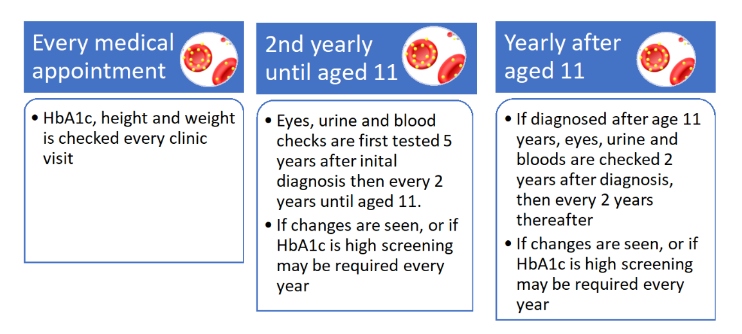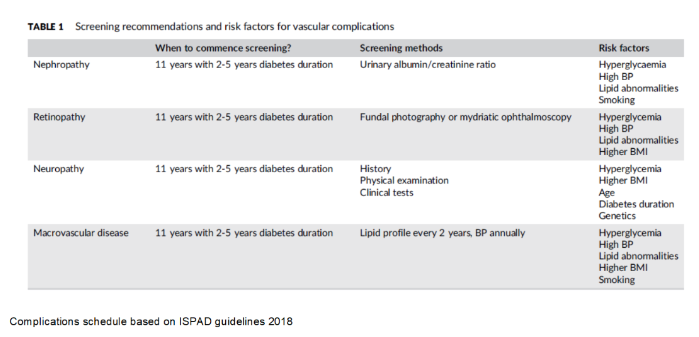It can be confronting and scary to talk about diabetes complications, but it’s important to know that they do not need to happen. If you know an elderly person with complications from diabetes, remember they were probably diagnosed long ago with very different treatment regimens and when HbA1c and blood glucose targets were not emphasised. It was only in the 1980s that home blood glucose checking and more modern insulin became available.
Knowing how to look after your diabetes and regular review of insulin doses is an important step in the prevention of complications. This includes: Blood glucose checking before every meal every day
· Regular review of insulin doses, keeping in mind your pre-meal target BGL of 4 – 7 mmol/L
· Carbohydrate counting and matching insulin doses to carbohydrates eaten
· Always giving insulin before eating
· Close management during sick days
· Seeing your diabetes doctor every 3-4 months, and making sure your HbA1c result is available at your appointment
· Keeping in contact with your diabetes nurse and dietitian between medical appointments when you need extra advice or support
· The HbA1c test is the best indicator of long-term blood glucose control. It provides a measure of the overall glucose control over the previous 3-4 months and important information about the relative risk of complications associated with long term elevated blood glucose levels.
Complication screening clinic at The Royal Children's Hospital (RCH)
Diabetes Complication Screening is offered to children and adolescents with diabetes as a routine screening tool. Screening allows for the detection of very early signs of complications, and when picked up early they can sometimes be reversed
Who organises complication screening for my child?
Your Endocrinologist will refer your child to the Complication Screening Clinic. Your appointment will be on the same day as your routine doctor’s appointment and must be arranged as a face to face review.
How will I get notified of my appointment?
An appointment letter with instructions will be sent to your home address.
What testing is needed?
· Eye Screening
This includes retinal photography (a photo of the back of the eye); sometimes a few photos are needed to get it just right, and visual acuity (reading a card from a fixed distance to check eyesight). If you prefer to have your eye screening performed with an external optometrist/eye specialist, please arrange for the results of your test to be emailed to diabetes@rch.org.au so that we can add this information to your medical record
· Urine test
Your child will need to provide a sample of the first urine of the day to check the amount of protein being passed into the urine. Collect this on the day of your appointment and keep it in the fridge until leaving home. An early morning sample gives a more accurate result than one done during the day. If you forget to do the morning sample a midday sample can still be used, although it may be less accurate and may mean that the sample needs to be recollected. You can collect a yellow collection container from your local pharmacy or pathology.
My child has been asked to do 3 early morning urine samples- what does this mean?
It is very common to have mildly increased levels of protein in your urine if the test is done during the day. If protein is found the levels need to be checked more closely. Your doctor will let you know if this is needed and we will send you instructions about how to collect the first urine of the day.
· Blood pressure
This is done both lying down and standing
· Nerve testing of the foot
A small plastic “monofilament” is touched on different places on the foot to test for sensation; this is often a bit ticklish!
· Blood tests
Blood is taken to check blood cholesterol, thyroid function and coeliac antibodies. Blood is taken from the vein but if this bothers you, you can ask for anaesthetic cream. Remember the cream takes 30 minutes to work so you will
need to allow extra time. For this appointment, please do not use the kiosk check in and do tell the receptionist at pathology you are needing complication screening bloods.
How often should complication screening happen?
Complications schedule based on ISPAD guidelines 2018


![]()